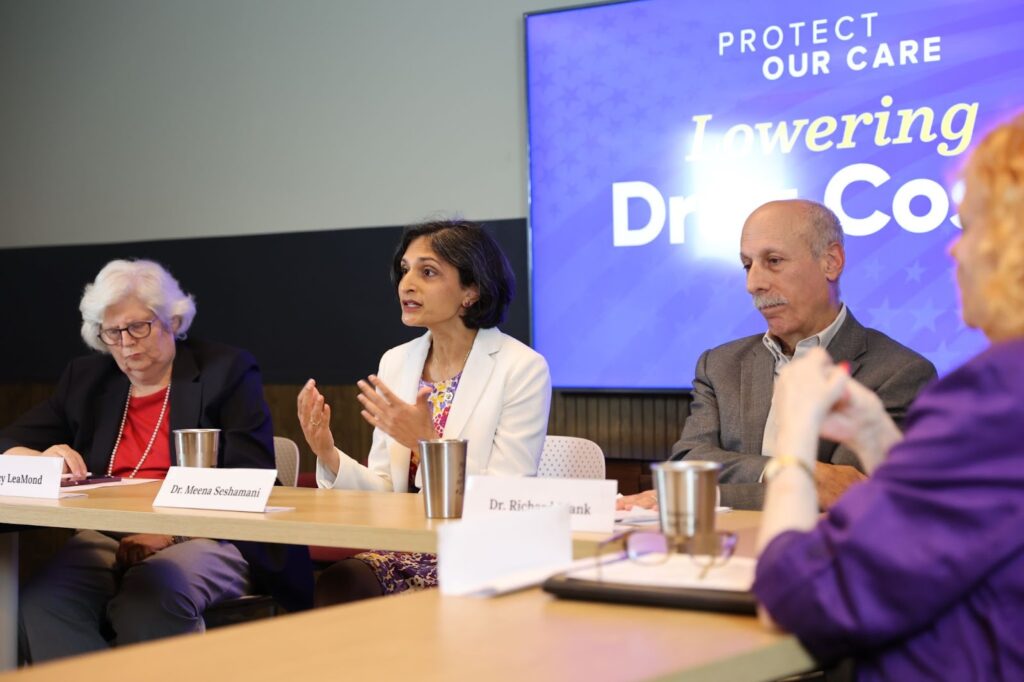Washington, DC — Today, CMS Deputy Administrator and Director Meena Seshamani, AARP Chief Advocacy Officer/Executive Vice President Nancy LeaMond, and Director of the Brookings Schaeffer Initiative on Health Policy Richard Frank joined Protect Our Care and health care advocates for a roundtable discussing how the Inflation Reduction Act is already delivering prescription drug savings to seniors across the nation. The event follows the Biden-Harris administration’s recent guidance on implementing the Inflation Reduction Act’s Drug Price Negotiation Program.
This fall Medicare will begin to negotiate drug prices for some of the most costly drugs covered under Medicare Part D. Protect Our Care recently released a new report that provides a detailed look at five drugs that may be eligible for the first round of negotiation, underscoring the importance of finally allowing Medicare to negotiate lower drug prices.
Seniors are already saving money as a result of the Inflation Reduction Act’s insulin copay cap and no-cost recommended vaccinations. The law has also reined in Big Pharma’s greed by requiring a rebate from drug companies that hike prices exceeding inflation. Soon, out-of-pocket costs will be capped at $2,000 annually for everyone who relies on Medicare, saving nearly 19 million people with Medicare an average of $400 annually.
“A theme of everything that we’re doing in Medicare is to put the more than 64 million people who rely on our programs front and center,” said Dr. Meena Seshamani, the Deputy Administrator & Director, the Center for Medicare, Centers for Medicare & Medicaid Services. “It is a very exciting time for us to be able to implement the new drug law. This is about enabling people to access the innovative therapies they need. Through the drug price negotiation process, we are putting people at the center and thinking about the real-world impact of these treatments. Being able to further that conversation will really advance health in our country.”
“It’s very hard to overstate how monumental the Inflation Reduction Act, specifically the Medicare Drug Price Negotiation Program, is for older Americans,” said Nancy LeaMond, Chief Advocacy and Engagement Officer/Executive Vice President at AARP. “This issue is deeply personal for families and impacts their day-to-day lives. We hear every single day how important it is, through our call center, through our meetings across the country, and with our members. The number one reason someone doesn’t fill a prescription is because they can’t afford to. The Inflation Reduction Act was a terrific step forward but we all have a lot to do to help with implementation and to continue to move forward.”
“The Inflation Reduction Act was crafted in a way that paid a tremendous amount of heed to concerns about innovation,” said Dr. Richard Frank, Director of the Brookings Schaeffer Initiative on Health Policy. “Nothing gets negotiated until it’s been out in the market for either nine or 13 years. Think about the types of drugs that are likely to be negotiated, which have been making $400 or $500 million a year for nine or 13 years. The chances of them not having the opportunity to recover their investments at a reasonable rate of return is vanishingly small. The narratives the industry is giving in the courtrooms and on the Hill are different from their narratives on Wall Street.”
“I was diagnosed with inflammatory arthritis and complex auto-immune problems, and now every three months, I spend between $1200 and $1500 out-of-pocket for my prescriptions,” said Sandra Klassen, patient storyteller from Fairfax County, Virginia. “My doctor wants me to try Rinvoq but on Medicare Part D, it will cost me $1300 dollars out-of-pocket a month – which is far too much since I’m retired and on a fixed income. The Medicare Drug Price Negotiation Program provides hope that eventually my expensive prescription costs will be substantially reduced.”
“Millions of seniors are counting on the successful implementation of the Inflation Reduction Act’s Medicare Drug Price Negotiation Program. We know that seniors have struggled with high drug costs for far too long, and the Inflation Reduction Act is bringing much-needed relief,” said Protect Our Care Chair Leslie Dach. “Many of the manufacturers of drugs likely to be eligible for negotiation have exploited the patent system to thwart generic competition and keep their prices high. They’ve made billions in profits while spending tens of millions of dollars on lobbyists and offshoring their profits to avoid U.S. taxes. Now, they’re suing to protect their profits and prevent the negotiation program from going into effect. Fortunately, the Biden administration is committed to helping seniors afford their life-saving medications while ending unchecked drug company greed.”


